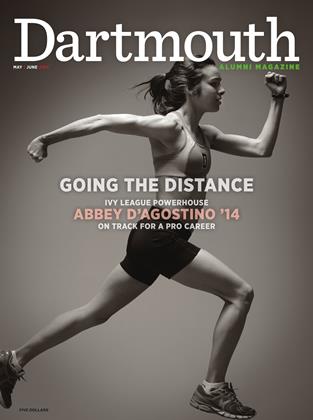Mixed
Four young alums open up about their multiracial heritage and how it shapes them.
MAY | JUNE 2014Four young alums open up about their multiracial heritage and how it shapes them.
MAY | JUNE 2014I hate it when people refer to me as half black or half Iranian. I am not half of anything. Thanks to my father, I am fully black and, thanks to my mother, fully Iranian. My identity cannot be reduced to mere fractions. I have often joked with friends that being both black and Middle eastern, i am america’s worst nightmare.
Growing up, I saw multiple cultural practices in my home every day. I saw them clash and create new norms, and I saw those norms turn into a culture in and of itself. I saw that nothing was stagnant or fixed. I saw that I had options and was eager to explore the identity choices I found laid before me.
Everyone navigates identity, but when race is introduced into the mix, the stakes are raised.
At an early age I learned how to twist my self-presentation to provoke specific respons- es from those around me. I was eager to figure out what identity I could drape around my shoulders most naturally. It was not the most fun or ho-hum moments that taught me which parts of myself to camouflage or accentuate— quite the opposite. To put it bluntly, I hated being followed around by store security and watching suburbanites cross the street when they saw me approaching.
I used my mixed identity to convey both positive and negative racial images. I love cof- fee shops, and grabbing a cup of “joe” is a daily ritual. If I want to get in and out without any hassles i wear a black hoodie, basketball sneak- ers and worn-out jeans. If I am open to convers- ing with older men sipping their lattes I wear slacks, a thin sweater and a trimmed beard. If I want to get some work done, I wear a T-shirt, my good jeans and a pair of Converse kicks. after i’ve worn a sweater in order to befriend latte-sipping regulars, when I walk in the next day wearing track pants and a Yankees cap, they often do not recognize me.
My freshman year at Dartmouth I made the mistake of thinking all liberal arts schools were bastions of liberalism. I dove headlong into a discussion with a 50-something academic, as- suming he would appreciate different people’s perspectives and backgrounds. He soon started railing, however, about then-candidate Barack Obama and how he had to choose either his fa- ther’s blackness or his mother’s whiteness. i am still unclear about the “why” of it all, but i clearly recall the last few moments of our conversation.
him: “i can tell you’re just going to dismiss what i’m saying because i’m an old white guy.”
me: “no, i’m going to dismiss it because you just don’t get it.”
ANISE VANCE ’11
A senior fellow at Dartmouth, Vance is pursuing an M.F.A. in creative writing at Rutgers.
“i WaS eager TO EXPLORE THE IDENTITY CHOICES I FOUND LAID BeFore me.”
 View Full Issue
View Full Issue
More From This Issue
-
 Feature
FeatureZoology
May | June 2014 By C.J. Hughes ’92 -
 Feature
FeatureGOOD HAIR
May | June 2014 By Ana Sofia De Brito ’12 -
 Feature
FeatureSEEKING TO BE WHOLE
May | June 2014 By Shannon Joyce Prince ’09 -
 Feature
FeatureONE PLUS ONE EQUALS THREE
May | June 2014 By Yuki Kondo-Shah ’07 -
 Sports
SportsOut of Nowhere
May | June 2014 By SARAH LORGE BUTLER -
 OUTSIDE
OUTSIDEConfluences
May | June 2014 By MICHAEL CALDWELL ’75
Features
-
 Feature
FeatureA Landmark Goes Down
OCTOBER 1966 -
 Feature
FeatureHAIR
November 1980 By Dan Nelson -
 Feature
FeatureA Panathenaic Prize Amphora
JUNE 1959 By DIETRICH VON BOTHMER -
 Feature
FeatureA Teaching Boon
MAY 1957 By JOHN B. STEARNS '16 -
 Feature
FeatureAn All-Time Dartmouth Team
October 1955 By LAURENCE H. BANKART '10 -
 FEATURE
FEATUREThe Rebel
JANUARY | FEBRUARY 2023 By TY BURR '80


